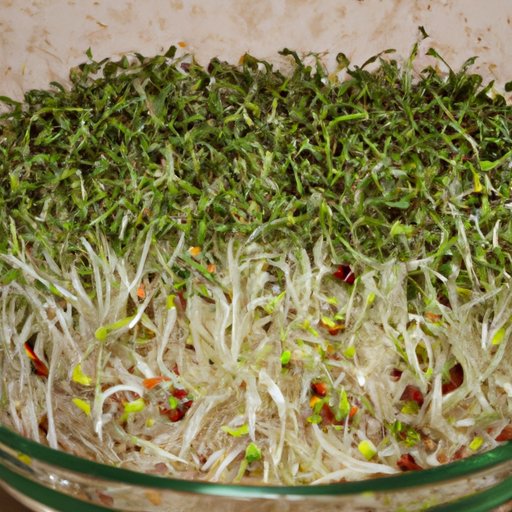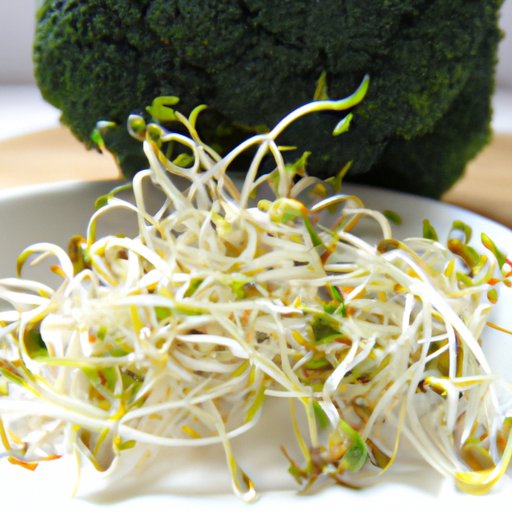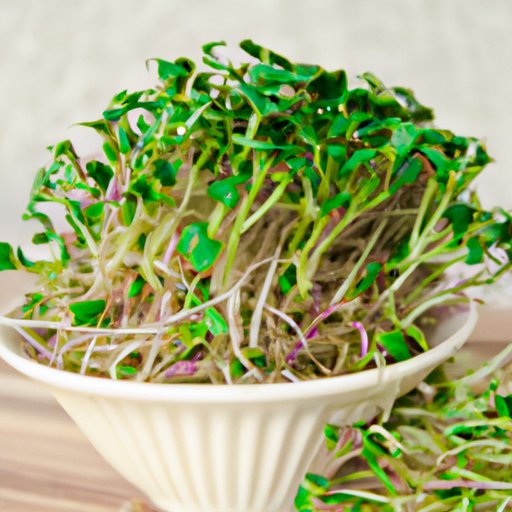Introduction
Broccoli sprouts are a type of cruciferous vegetable that is related to broccoli, kale, cauliflower, and Brussels sprouts. They are known for their high concentration of nutrients, including Vitamins A, C, and K, as well as minerals like calcium, iron, and magnesium. In addition to these vitamins and minerals, broccoli sprouts also contain phytonutrients and antioxidants, which are known for their potential health benefits.

Exploring the Nutritional Benefits of Broccoli Sprouts
When it comes to nutrition, broccoli sprouts are packed with vitamins and minerals. One cup of broccoli sprouts contains approximately 20 calories, 2 grams of protein, 5 grams of carbohydrates, and 1 gram of fiber. It also provides Vitamins A, C, and K, as well as calcium, iron, and magnesium. In addition, broccoli sprouts are a good source of folate, potassium, and zinc.
In addition to its high concentration of vitamins and minerals, broccoli sprouts are also rich in phytonutrients and antioxidants. Phytonutrients are naturally occurring compounds found in plants that can help protect the body against disease. Antioxidants, on the other hand, are molecules that can help combat free radicals and reduce oxidative stress, both of which can lead to cell damage and chronic diseases.
Examining the Health Advantages of Eating Broccoli Sprouts
Eating broccoli sprouts may offer a variety of health benefits. For example, studies have found that they have the potential to fight cancer. Research has shown that the sulforaphane present in broccoli sprouts can help inhibit the growth of certain types of cancer cells. Additionally, broccoli sprouts are a rich source of antioxidants and anti-inflammatory compounds, which can help reduce inflammation and improve overall health.
Another potential benefit of eating broccoli sprouts is improved digestion and gut health. Studies have found that the compounds present in broccoli sprouts can help stimulate the production of beneficial bacteria in the gut, which can help improve digestion and gut function. Furthermore, broccoli sprouts are a good source of fiber, which can help promote regular bowel movements and reduce the risk of digestive issues like constipation and bloating.
A Guide to Adding Broccoli Sprouts to Your Diet
If you’re interested in incorporating broccoli sprouts into your diet, there are a few tips to keep in mind. First, make sure to store them properly in the refrigerator to ensure they stay fresh. Second, when preparing broccoli sprouts, rinse them under cold water and pat them dry before cooking. Third, try adding them to salads, soups, stir-fries, omelets, and other dishes for an extra nutritional boost.
Are Broccoli Sprouts Good for You? An Evidence-Based Analysis
When it comes to determining whether broccoli sprouts are good for you, it’s important to look at the evidence-based research. Several studies have been conducted examining the potential health benefits of eating broccoli sprouts. The results of these studies suggest that broccoli sprouts may offer several health benefits, including cancer-fighting properties, anti-inflammatory compounds, improved digestion, and gut health.
However, it’s important to note that not everyone should consume broccoli sprouts. People who have food allergies or intolerances should avoid eating them, as they may trigger an allergic reaction. Additionally, people with certain medical conditions or diets should speak with their doctor before adding broccoli sprouts to their diet.

The Pros and Cons of Broccoli Sprouts in Your Diet
When deciding whether to include broccoli sprouts in your diet, it’s important to consider the pros and cons. On the one hand, broccoli sprouts are a nutrient-dense food that may offer various health benefits, including cancer-fighting properties, anti-inflammatory compounds, improved digestion, and gut health. In addition, they are versatile in recipes and easy to prepare.
On the other hand, broccoli sprouts may not be suitable for some diets and may trigger an allergic reaction in people with food allergies or intolerances. Additionally, some people may not enjoy the taste of broccoli sprouts, which could make it difficult to incorporate them into your diet.

What Science Says About the Benefits of Eating Broccoli Sprouts
Overall, the evidence-based research suggests that consuming broccoli sprouts may offer a variety of health benefits. While it’s important to consider the potential risks associated with eating broccoli sprouts, the potential health benefits appear to outweigh the risks for most people. The recommended daily intake for broccoli sprouts is 3-4 ounces per day.
Conclusion
In conclusion, broccoli sprouts are a nutrient-dense food that may offer numerous health benefits, including cancer-fighting properties, anti-inflammatory compounds, improved digestion, and gut health. While there are potential risks associated with eating broccoli sprouts, the evidence-based research suggests that the potential health benefits outweigh the risks for most people. As such, incorporating broccoli sprouts into your diet may be a good way to improve your overall health and wellbeing.
(Note: Is this article not meeting your expectations? Do you have knowledge or insights to share? Unlock new opportunities and expand your reach by joining our authors team. Click Registration to join us and share your expertise with our readers.)
